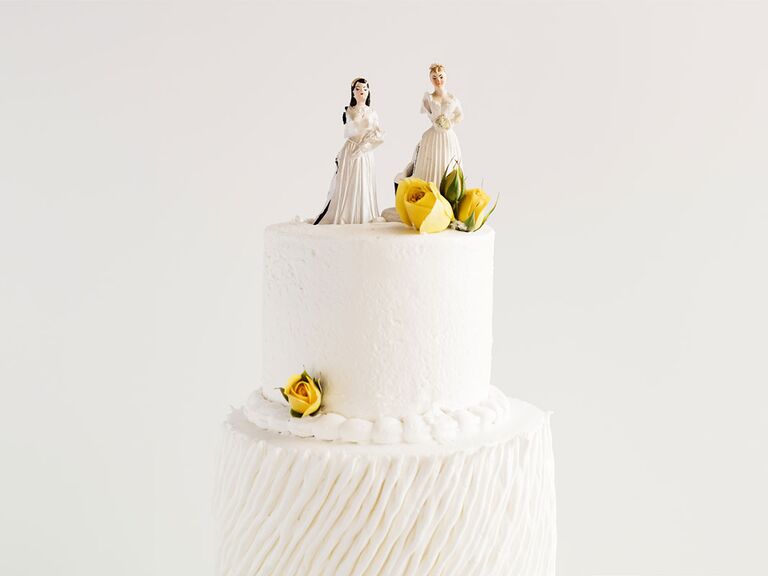It's Time We Stop Calling Women "Bridezillas" Once and For All

You don't have to be engaged or married to recognize common wedding lingo—from receptions and honeymoons to MOH and MIL, the industry is full of phrases and abbreviations that are freely tossed around by couples, vendors and guests alike. Of course, wedding vernacular evolves over time, and in recent years we've welcomed new phrases, like minimonies, microweddings and latermoons. A word that doesn't seem to go away, though, is perhaps the most damaging: bridezilla.
It's one of the most common wedding terms out there. Your friend is stressing out over reception place settings? You might call her a bridezilla. Kate Hudson and Anne Hathaway are fighting over a venue in the movie Bride Wars? They're bridezillas too. That influencer you follow is talking about her wedding on Instagram stories once again? She's probably a bridezilla. It's all too easy to label any stressed-out bride as a bridezilla—people have been doing it for years. But we're here to say it's time to retire the word bridezilla once and for all.
Dr. Jocelyn Charnas, PhD, Clinical Psychologist (also dubbed "The Wedding Doctor"), argues that the term vilifies women for having standards and expectations for their weddings. "I am very much in favor of losing the term bridezilla," she tells us. "It's denigrating and pathologizing what really is a normal process of responding to a high level of stress. And, most basically, it's a sexist term."
Here's the truth: While it may seem like calling someone a bridezilla is a funny way to joke about weddings, the word is rooted in stereotypes—and it has no place in our vernacular any longer.
In this article:
What is a Bridezilla?
To understand why it's time to retire the term, it's helpful to know the bridezilla meaning and its origins. The word "bridezilla" is a compound of "bride" and "Godzilla," and was created to depict women who plan their weddings with outrageous standards and bad behavior. (The same is true of "groomzilla," which, of course, refers to grooms.) Bridezillas are known for having unreasonable expectations and emotional outbursts directed at friends, family and wedding vendors due to high levels of stress and demands for perfection.
Where Does the Bridezilla Term Come From?
The word bridezilla made its print debut in an article titled "Tacky Trips Down the Aisle," written by Diane White for The Boston Globe in 1995. The piece classifies bridezillas as women who "lose sight of the solemnity of the wedding".
This, in theory, is somewhat understandable. While wedding planning is stressful, it's unfair (and uncalled for) to treat anyone with disrespect—especially those who are lending their help, like wedding vendors and loved ones. But over the years, the word bridezilla has been sensationalized to mock women simply for having standards. In 2004, a reality series titled Bridezillas debuted, which chronicled the lives of women with outlandish expectations for their weddings. Because drama sells, countless movies, TV shows, books and articles have since made fun of women who have emotional ties to their wedding. But we must also recognize that the wedding day is often regarded as the most important day of a woman's life—that concept in itself creates an exorbitant amount of pressure to "get it right."
The digital era has only exacerbated the issue. Reddit threads, Instagram posts, TikTok videos, and Facebook groups all contribute to the narrative that women become beasts when they're engaged. For those actually in the midst of planning, these damaging dialogues are coupled with feelings of comparison that accompany viral videos and pictures of lavish weddings, creating a perfect storm of amplified pressure and stress directed at all to-be-weds—especially women.
"The stress, anxiety and pressure involved with planning a wedding have all been around for a long time, but it's particularly magnified by media, and more specifically social media," Charnas explains. "We have so much more access to information, which creates the concept of expectations being set so high. Social media magnifies the problem."
Why We Should Stop Using Bridezilla
Even worse, perhaps, is that some wedding planners say the majority of their clients don't act like bridezillas. Such is the case for Michelle Gainey, Atlanta-based wedding planner and founder of Lemiga Events. "By far, my clients are kind and considerate," she says. "They want an amazing day, but they also take care of their friends and their family that are involved in the process. They appreciate how hard their vendor team works for them, and want everyone to know how appreciative they are." Lauren Dickens, NYC wedding planner and founder of Elle Audrey Events, echoes this sentiment. "My clients ask for things in a way that is respectful and well-mannered," she explains. "Plus, the majority of couples approach the process as a team, which makes the experience go smoothly."
So, if the existence of true bridezillas is so limited, why is the phrase still so common in everyday language? Some might just toss around the word "bridezilla" in good fun, assuming it's harmless—but it's far deeper than that, and it's time to stop using it once and for all.
The bridezilla meaning is rooted in sexism and gender stereotypes.
First and foremost, calling anyone a bridezilla is sexist. "We have a long history of pathologizing women's emotions, reactions and behaviors," Charnas says. For context, she notes that "hysteria" was a diagnosis given to women through the American Psychiatric Association's Diagnostic and Statistical Manual of Mental Disorders (DSM) until 1980. "The concept of denigrating women's behaviors is not new, and the term bridezilla is just another version of it."
Beyond that, the word bridezilla reinforces the narrative that the wedding day is all about the bride. The industry has long catered to heterosexual relationships, and only recently have people started to change their vernacular to make wedding terminology more inclusive to all couples (such as swapping "bridal shower" for "wedding shower," or simply saying "couples" instead of "brides and grooms"). There is still much more work to be done, and recycling the phrase bridezilla continues to uphold this harmful concept by putting all the focus on brides.
Calling women bridezillas reinforces the narrative that they're too emotional—but planning a wedding is emotional.
It may seem easy to scoff at women for obsessing over seemingly small or minuscule issues, like bouquet arrangements or place card settings. The unfortunate truth, though, is that women are conditioned to believe that the wedding day is the most important day of their lives, meaning they have one shot to get it all perfect. "As a planner and a former bride myself, there's an assumption that you typically have one wedding day, so you want to get it right the first time," Dickens explains. "Personally, I was very adamant about some of the things I wanted and I understand why other brides can be that way—this is their once-in-a-lifetime moment."
Weddings are marketed to young girls at an early age, thus creating a buildup of anticipation for when theirs actually arrives. Given the societal significance of the actual event, some brides may feel caught up in a whirlwind of making things perfect for that one day, resulting in an emotional rollercoaster. "So much focus is put on the wedding day and all the fun elements like the party, the attire, the food, the flowers—it's literally called 'the big day,'" Charnas explains. "Of course, these are important, but as a result of that pressure and that intense focus on the day, there is not enough focus or attention paid to the fact that the wedding is one day but the marriage is a lifetime."
With social media and societal pressures, wedding planning is harder than ever before.
As Charnas noted above, wedding stress certainty isn't new. But thanks to social media delivering an endless feed of ideas, inspiration, and conversation, it can feel even harder for couples to turn off the noise and stop comparing their weddings to others. "With social media, celebrity and influencer culture, and standards of beauty, it's so easy to develop unrealistic expectations and lose perspective on what the symbolism of the day is," she adds.
Although using the internet can be an innovative way to find wedding inspiration, discover vendors, and connect with other to-be-weds, too much exposure can also lead couples down the rabbit hole of comparison and stress. Constantly seeing viral first looks or lavish floral decorations can make people question their decisions, or worry that their efforts aren't good enough. "It can be healthy to take inventory of how social media is making you feel," Gainey suggests. "Is it inspiring and encouraging you? Or, is it making you feel that you're caught in the comparison game and not feeling positive about your wedding? Pausing the scrolling can be a good thing."
Let's Focus on Mental Health
Mindlessly throwing around the word bridezilla is not only damaging, but it steers the conversation away from what's most important. Rather than vilifying couples—particularly women—for having emotions about their weddings, it's time to focus on changing the system and providing couples with the resources needed to enjoy the planning process, rather than dread it. "Instead of labeling or name-calling women who are reacting to this system, it's better to spend some time trying to look at it, challenge it, question it, and ultimately change it," Charnas reflects.
For too long, the concept of talking about wedding planning stress and acknowledging the pressures placed on couples was taboo—but one way to ignite positive change is to retire terminology that upholds the stereotype. "It's not good to label anyone with a name, and we shouldn't call people bridezillas," Dickens says. "It's okay to be passionate about your wedding."
In fact, having a healthy balance of passion and respect is the best way to tackle weddings today. While it's well past due to retire the term bridezilla, it's also time to approach weddings (and the entire planning journey) with grace and empathy "We need to hold onto what's most important and the reason behind what we do," Gainey says. "I hope there will be a new term where brides can emerge around this concept of love and celebration, and having the opportunity to gather with friends and family in a healthy, positive way."























